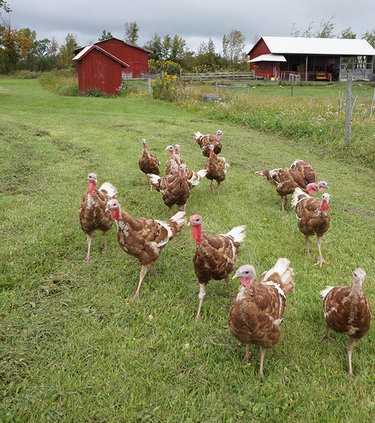Knox farmers vanish after being sued for debts
Enterprise file photo — Marcello Iaia
Alexander “Sandy” Gordon’s farm in Knox is pictured before it was run by Joshua and Stefanie Rockwood, who have since abandoned the farm and their financial obligations to Gordon, who sold them equipment and livestock. The farm is now owned by Justin and Damien Butts.
KNOX — Former Knox farmers Joshua and Stefanie Rockwood appear to be on the run from a lawsuit from Alexander “Sandy” Gordon, also a former Knox farmer, who’s attempting to collect their $130,000 of outstanding debt from the couple.
The Rockwoods had been the new generation chosen in 2018 to carry on the legacy of Gordon Farms, who sold them $185,000 worth of livestock and equipment under a roughly three-year repayment agreement, according to court documents.
Gordon, who ran the farm since 1983, had sold his 103-acre property to the American Farmland Trust, which then leased it to the Rockwoods, according to court documents. An Enterprise article from 2019 about the transition said the couple have two sons, Roman and Hunter, who were ages 6 and 9 respectively at that time.
Gordon told The Enterprise in 2019 that he was assisting the Rockwoods at their farm, and said it was difficult for small farms to succeed, noting that banks tend to be wary about granting loans, favoring corporate farms instead.
Two years later, on Aug. 11 of 2021, one day before the Rockwoods were due to pay Gordon in full, Joshua Rockwood’s attorney, Michele Anderson, requested from Gordon’s attorney, Phil Vecchio, a 90-day extension on the repayment agreement, explaining that Rockwood had recently decided to close the farm since it was no longer economically viable, and that the 90-day extension would give him time to liquidize his assets, according to emails included in the court records.
“We would definitely like to avoid a fire sale scenario and the additional time would help,” Anderson wrote in her email.
Vecchio then requested that the Rockwoods make concrete assurances in exchange for the extension, and later said that Gordon would agree if the Rockwoods were to sign a confession of judgment, which would allow Gordon to obtain legal remedies more easily in the event of another default.
Vecchio also pointed out that Joshua Rockwood appeared to have taken steps to transfer assets to his wife, which Anderson said was not the case, and that whatever Vecchio was referring to were old court filings.
In his emails to Anderson, Vecchio repeatedly voiced his frustration about the difficulties he was having in getting responses from her; the Rockwoods’ apparent refusal to agree to any assurances; and the concern his client, Gordon, had about losing his “life savings.”
“[Gordon] seems to be painting Joshua as having done something wrong and the only vibe I’m getting from Joshua is that farming was much harder than he thought it would be but he’s trying to do right by everyone,” Anderson wrote.
By September that year, negotiations between Anderson and Vecchio broke down, and Anderson stopped representing Rockwood, saying in an email to Vecchio that she didn’t “want to be responsible for defending a litigation.”
Rockwood, who remained without an attorney, did not respond to a lawsuit filed by Gordon in September, and was ordered by the courts on Nov. 29, 2021 to pay more than $140,000 in debt, interest, and taxes and fees.
Also, in 2021, Rockwood was subject to another lawsuit, from a grain supplier, to whom he had owed more than $22,000.
Apparently, though, nothing came of the order related to Gordon’s suit, and on Aug. 12 of this year, Gordon filed another lawsuit, this time naming Stefanie Rockwood as a defendant in addition to Joshua.
But the lawsuit was unable to be served, as the Rockwoods could not be located, despite attempts being made to serve them at his mother’s house while they were expected to be in town for a funeral, according to court documents, which also say that, in September, Joshua Rockwood refused to give his address while in a remote conference before a judge in Putnam County.
Court records say that an address for Joshua Rockwood was obtained from the United States Post Office, suggesting that he had taken up residence in Livingston, Texas at a park for recreational vehicles called “Escapees RV Park.” However, a process server found that it was connected to an unmanned box office and was unable to serve them, the records indicate.
The Rockwoods are still apparently nowhere to be found, and Gordon has been ordered by the New York State Supreme Court to serve them by means of a month’s worth of legal notices, the first of which was published in The Enterprise this week.
Gordon declined to comment this week because litigation is ongoing.
The West Wind Acres Farm property — located on Beebe Road — is now owned by Justin and Damien Butts, who it bought from the New York Farm Fund this summer, according to Albany County records, with a $300,000 mortgage agreement.
Justin Butts, who could not be reached by The Enterprise, is a Black farmer, chef, Navy veteran, and artisanal soap maker from Pennsylvania, according to his LinkedIn profile and an interview he did with the magazine Dirt.


